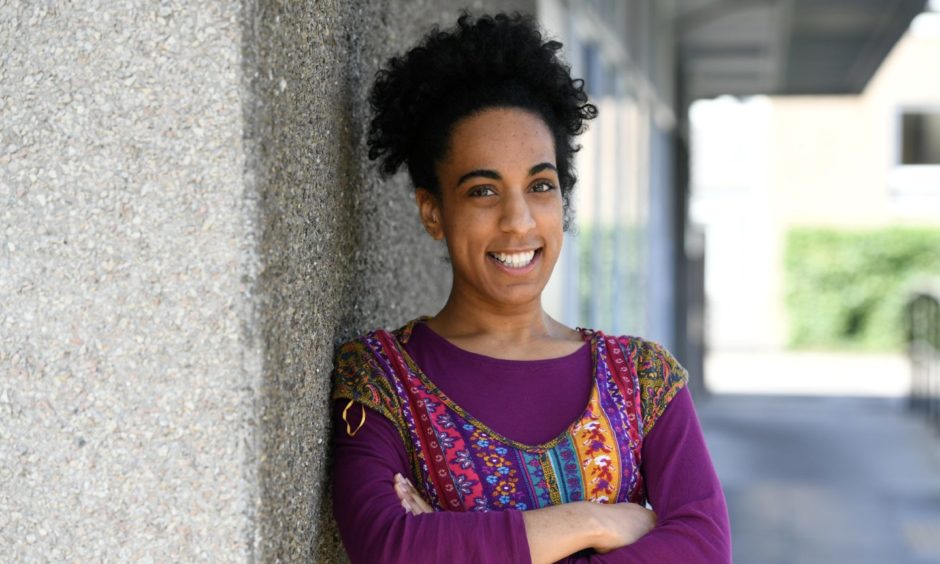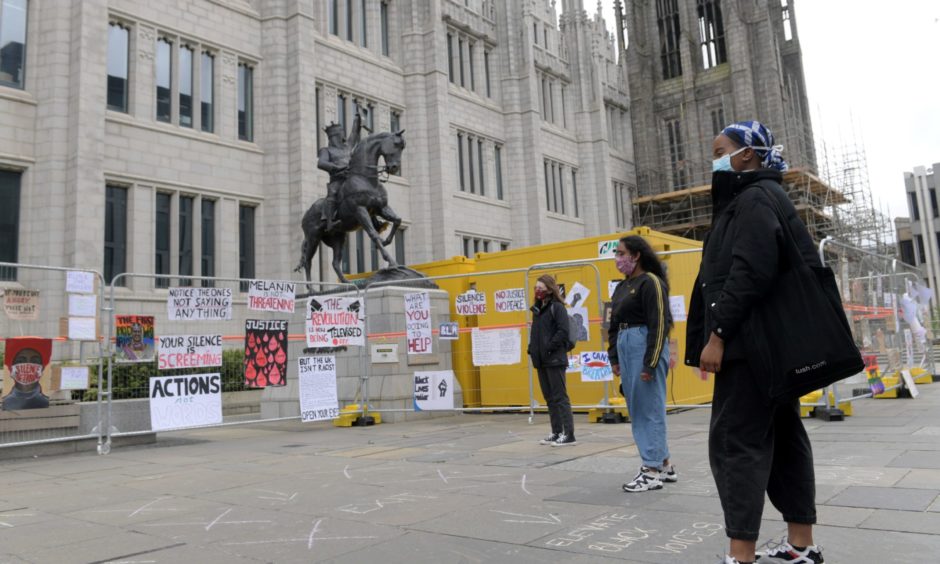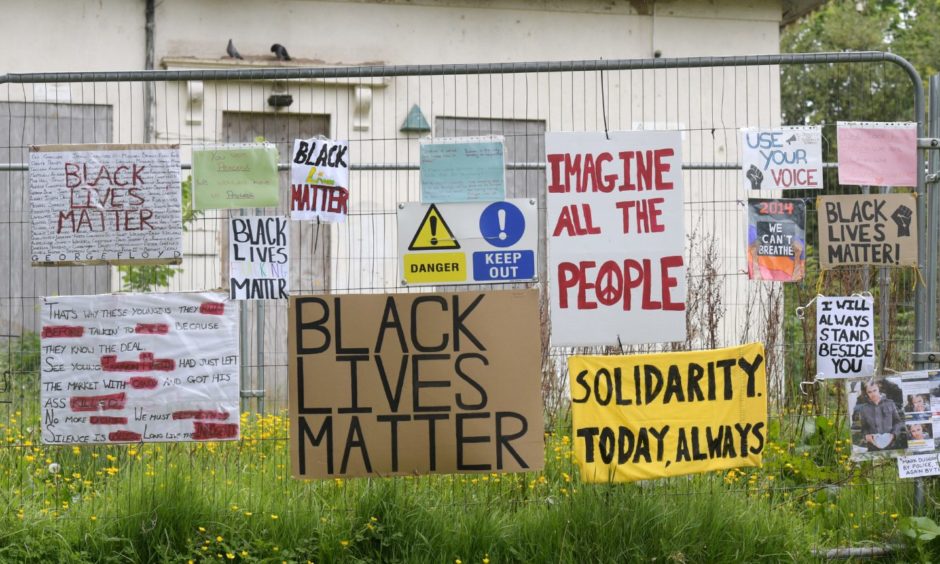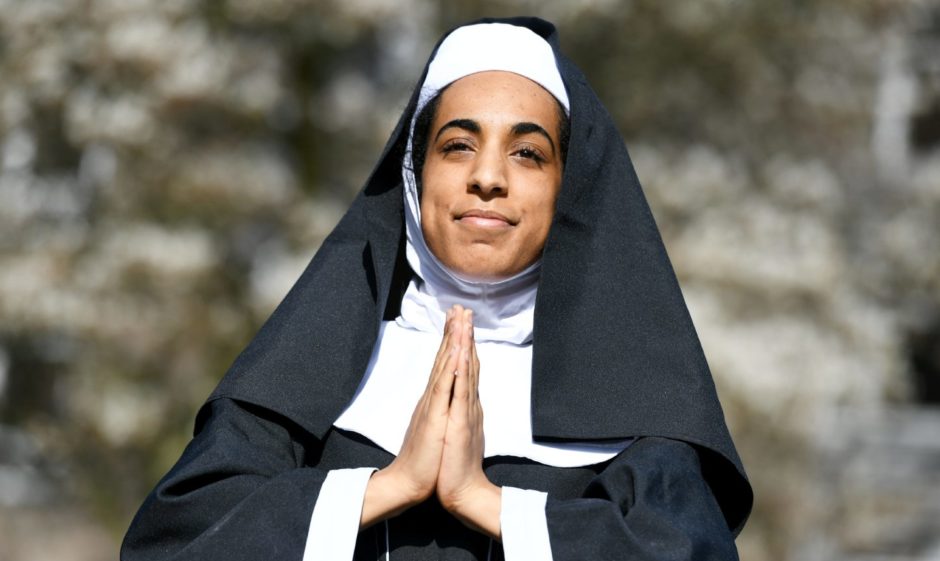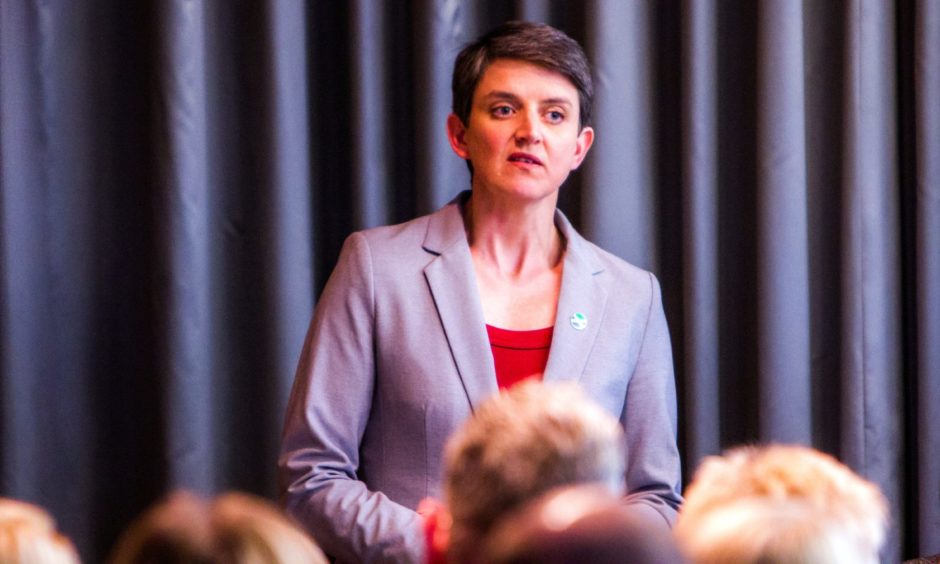Mae Diansangu could not have known that her year would be transformed by the killing of a man almost 4,000 miles away from her home in Aberdeen.
She had followed the Black Lives Matter (BLM) movement since its inception in 2013, but admitted to being taken aback by the global reaction to the death of George Floyd.
Keen to ensure the issues raised by the case did not go unnoticed in her home city, Ms Diansangu and her partner, Hanna Louise, used their platform as organisers of a semi-political arts group, Hysteria Aberdeen, to bring the movement to the north-east.
An eye-catching poster campaign got under way across the Granite City, to get the message across while avoiding mass protest gatherings during the pandemic.
“Because we have a reasonable-sized platform we came up with the idea of the poster protest, and we decided to use that as a platform to get it out to as many people as possible,” she said.
“So, that was a really great success. We managed to organise it at quite short notice and it all went quite well, and the posters were up for quite a while as well, so that was really positive.”
The poster campaign was just the beginning, however, and Ms Diansangu is now in discussions with BLM co-ordinators from various regions about the formal creation of a Scotland-wide organisation.
“We saw this opportunity with all the exposure and all the protests that were happening in Scotland and obviously in the UK,” she said.
“Over the past few months we’ve been meeting quite regularly, over Zoom obviously, and we’ve just been trying to figure out how we want the organisational structure to be, what we are actually going to do.
“It’s very much in its beginnings, it has been very behind the scenes, and we’ve only just got our Facebook up and running, and we’ll have a website soon.
“I guess these things don’t just happen overnight, and we are a lot of different people connecting all of a sudden over this issue, so hopefully that is going to pick up some traction soon, and we will have more of a presence, more of a reach and be able to organise and bring about actual change in Scotland.”
I was really amazed that so many people actually cared and were doing things.”
Ms Diansangu, a born and bred Aberdonian who is in her final year of a social sciences degree at Robert Gordon University, has been determined to capitalise on the momentum of the BLM protests to build a lasting legacy in Scotland.
“For whatever reason, this really grabbed the attention of everyone, and it was really great to see that there was this momentum,” she said.
“I think I personally, having seen a list of black people who are killed by the police year after year not getting that much attention, I was really amazed that so many people actually cared and were doing things, they were Tweeting about it and they were going to protests.
“And I felt like, ‘this is great that people are involved’ but obviously as the news cycle goes on, less people are going to be talking about this, and this was going to be last month’s news.
“So, starting to organise with other BLM activists in Scotland was kind of my way of saying, ‘okay, we need to keep this momentum going, and it’s not just one person’s death a few thousand miles away’.
“It’s actually a really profound issue that happens all over the world, and it happens here in Scotland too, so let’s capitalise on this moment and not let it just be a moment, but to keep building and organising and let people know that we are here to stay.”
The BLM protests were Ms Diansangu’s first involvement in politics at an organisational level but her interest in the subject began much earlier.
“I think I have always been quite a political person. I think the first really important protest I went to, my mum took me to, and that was against the Iraq war,” she said.
“They were really, really big protests – thousands of people took to the streets all over the country, and it was really big in Aberdeen too. I would have been about 11 or 12, I think.
“While I was there I was reading the signs and thinking about what it was all about. It was the first time I really had the chance to think about global politics.”
After school, Ms Diansangu had initially studied at Stirling University, where she first became engaged in the debate over Scotland’s constitutional future.
“I remember there was a talk and it was pro-independence and then pro remaining in the UK,” she said.
“I went into it not very sure and then afterwards, I thought, ‘who would I rather go to the pub with?
“I believed in the arguments as well but, I don’t know, there was just something much more relatable about the people.
“I started to think about it and read about it and that’s when I kind of decided, ‘yeah okay, this makes sense’.”
When a majority of Scots voted against independence in 2014, Ms Diansangu said that was when she “started to think that things have to change”.
She added: “I always had quite strong political opinions but I kind of felt like I wasn’t really, maybe, putting it into practice so much, so I thought, ‘well, maybe it would be good to join a political party.
“I had voted for the Greens and I felt like their party was the one that most aligned with how I felt about politics, having been completely disillusioned by all the other major parties in Scotland and the UK.”
Maggie Chapman, former co-convener of the Scottish Greens, said: “Mae is a phenomenal campaigner, having done great work linking up the Black Lives Matter movement across Scotland, and is an asset to the Scottish Greens.”
While Ms Diansangu primarily considers herself an activist, could her recent move towards being a political organiser pave the way for a future in parliamentary politics?
“If you had asked me that maybe, like, two or three years ago, which I think Guy Ingerson (convener of the Aberdeen Greens) actually did, I was just like, ‘absolutely not, no’.
“But now I’m sort of thinking, ‘well, I don’t think so, but… I don’t know”.
She added: “I feel like you have a lot more freedom if you are an activist. You don’t have to be so respectable or careful of what you say, or diplomatic or compromising.
“So I think that is something that would put me off a little bit, because I think whenever you enter the political arena or stage, you don’t become less authentic, but obviously there are things you think, ‘well, I can say this and I can’t say that’.
“That is something I would personally struggle with. I don’t think I would rule it out, but just now I’m quite involved with the Black Lives Matter (movement) so that is obviously not party politics, but it is very political.”

